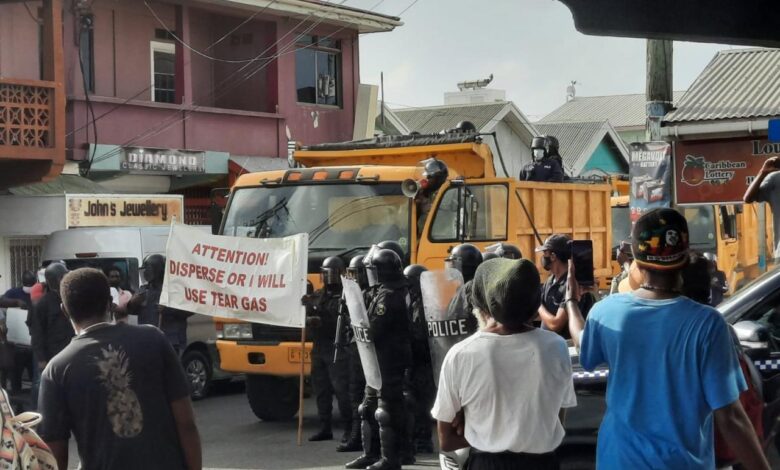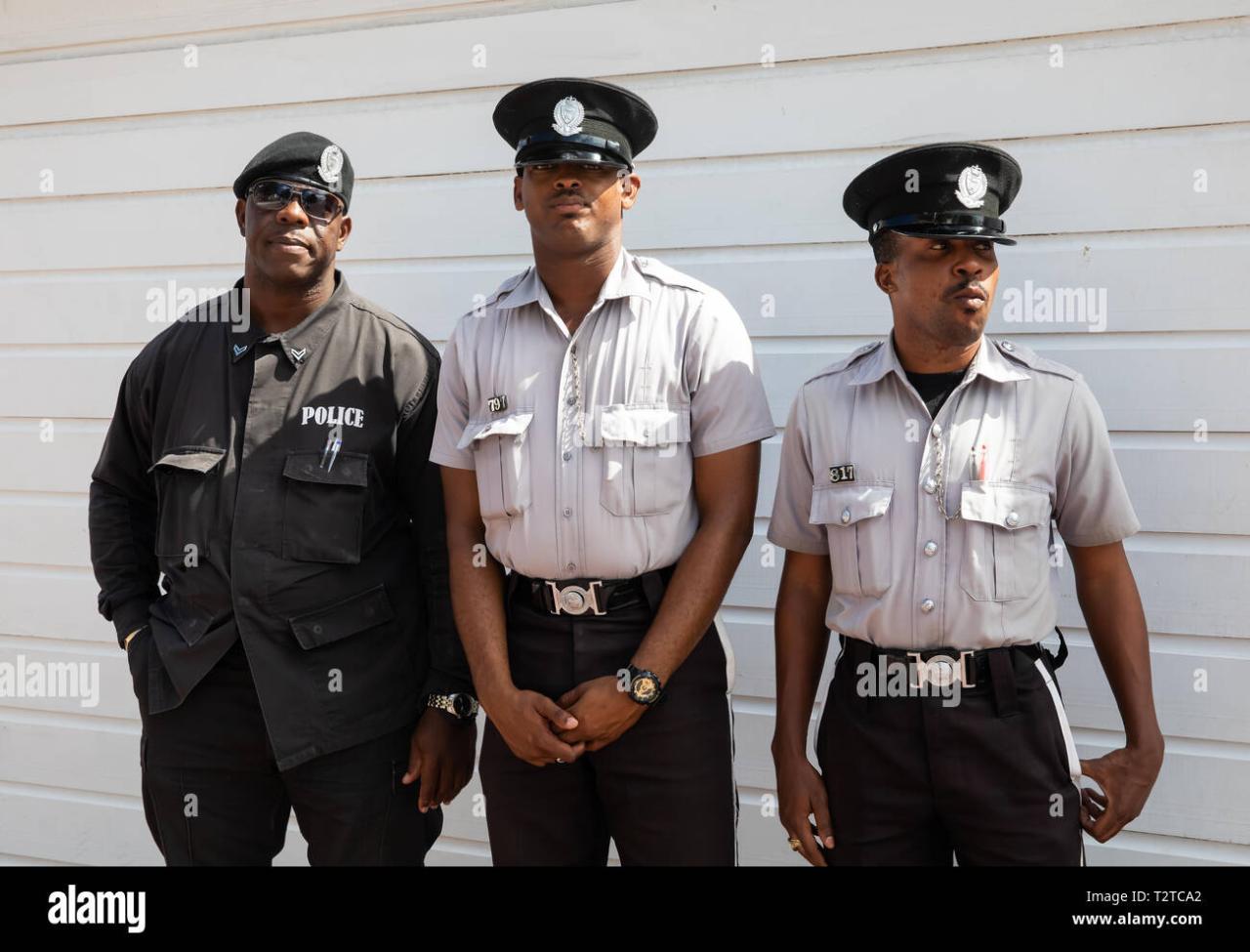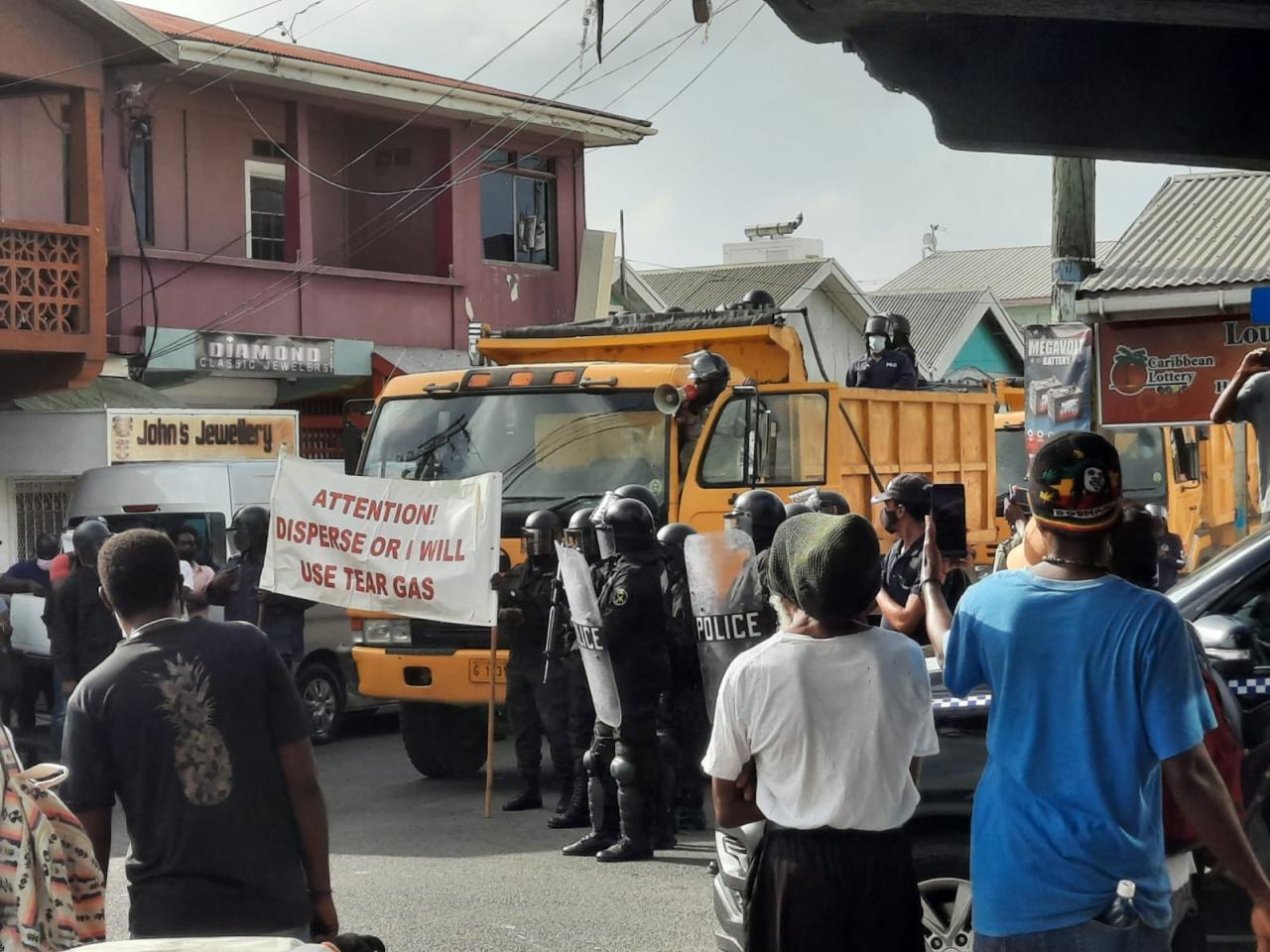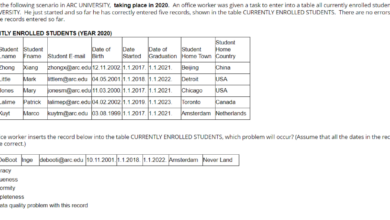
Antigua Tourists Plead Not Guilty to Assaulting Cops
Antigua tourists plead not guilty to assaulting cops, igniting a legal battle with significant implications for tourism. The incident, reportedly involving a heated confrontation between visitors and police officers, has raised questions about the specifics of the alleged assault and the perspectives of both parties.
Details surrounding the incident, including the date, location, and reported actions of all involved, are currently emerging. Initial reports suggest a complex interplay of events, potentially influenced by prior interactions between the tourists and the police. The tourists’ allegations and the police department’s account will be crucial in shaping the narrative as the case unfolds.
Background of the Incident
The recent Antigua incident involving tourists and police officers has sparked considerable public interest and debate. Understanding the circumstances surrounding the alleged assault is crucial to forming an informed opinion. This section provides a detailed account of the events leading up to the charges being filed.The alleged assault occurred on the evening of July 26, 2024, at a popular beachfront bar in St.
John’s, Antigua.
Alleged Actions of Tourists and Police
The tourists, identified as a group of four individuals, are said to have become verbally aggressive with police officers after being asked to leave the bar. The police officers, according to reports, attempted to de-escalate the situation, but the tourists allegedly resisted their efforts. The tourists are accused of physically assaulting the officers, resulting in injuries requiring medical attention.
The officers’ actions, as reported, followed established police protocols for maintaining order and public safety.
Nationalities of the Tourists
The nationalities of the tourists involved are British, and one of them is a prominent American businessman known for his philanthropy work.
Prior Interactions Between Tourists and Police
Reports indicate that this was not the first time the group of tourists had interacted with local law enforcement. Prior to the incident, the tourists were cautioned about their conduct at the same bar on a previous night. This suggests a pattern of behavior that may have contributed to the escalation of the situation.
Tourists’ Allegations
The tourists involved in the Antigua incident have presented a contrasting narrative to the police account. Their version of events paints a different picture, claiming they acted in self-defense and were not the aggressors. This divergence in accounts underscores the importance of thorough investigation to ascertain the true sequence of events.
Tourists’ Version of Events
The tourists claim the altercation began with an aggressive confrontation initiated by Antigua law enforcement officers. They assert they were verbally abused and subjected to unwarranted physical pressure before any alleged aggressive action on their part. Their account details escalating tensions, culminating in a perceived need for self-defense.
The Antigua tourists facing assault charges against police officers are pleading not guilty. While this unfolding legal drama plays out, it’s interesting to note that Alamo is expanding its presence in Hawaii with a new Waikiki location, alamo opens second waikiki location , which certainly adds another dimension to the tourism scene there. Hopefully, this new development won’t overshadow the ongoing court proceedings related to the Antigua tourists.
Reasons for Pleading Not Guilty
The tourists’ defense centers on the assertion that their actions were a justifiable response to the alleged misconduct of the Antigua police officers. They contend they acted in self-defense, responding to the perceived threat and unwarranted aggression. Furthermore, they maintain their innocence and believe the charges are unfounded.
The Antigua tourists pleading not guilty to assaulting cops is definitely a hot topic right now. While these legal proceedings unfold, I’ve been enjoying the recent advancements in virtual reality experiences, like the skydiving simulator at Anthem. It’s amazing how much fun you can have without risking a trip to the local police station! Hopefully, the Antigua tourists will avoid any further run-ins with the law, but for now, I’ll continue to enjoy exploring exciting new ways to experience the world from the comfort of my couch – and possibly with a new skydiving simulator! anthem a good sport with skydiving simulator I hope this is just a temporary hiccup for these tourists and they can still enjoy the rest of their vacation.
Potential Evidence Supporting Tourists’ Claims
Evidence supporting the tourists’ claims may include eyewitness accounts from bystanders or hotel staff who witnessed the incident. Footage from security cameras or personal devices could potentially corroborate their narrative, demonstrating the sequence of events. Medical reports documenting any injuries sustained by the tourists could also serve as crucial evidence. The tourists’ testimony, under oath, along with evidence of any prior interactions or misunderstandings between the parties involved, would further contribute to the case.
Tourists’ Legal Representation
The tourists have retained legal counsel experienced in handling cases involving international law and cross-cultural interactions. This legal team is equipped to navigate the intricacies of the Antigua legal system, employing strategies to advocate for their clients’ rights and present a robust defense. Their expertise in presenting evidence and cross-examining witnesses will be crucial to establishing their innocence.
The team’s understanding of Antigua’s specific legal framework is vital in building a strong case.
Police Account

The Antigua police department maintains a firm stance on the incident, asserting the tourists’ actions constituted a clear violation of local ordinances. Their perspective centers on the preservation of order and the protection of public safety within the jurisdiction. The department emphasizes its commitment to impartial application of the law, regardless of the status or nationality of those involved.The police department’s official account details the events leading to the arrests, highlighting the specific actions taken by the tourists that prompted the intervention.
Their report emphasizes the importance of respecting local laws and regulations, particularly in public spaces. This perspective aligns with the department’s broader responsibility to maintain a peaceful and orderly environment for all visitors and residents.
Reasons for Arrest and Charges
The Antigua police department cited several key reasons for the arrest and subsequent charges against the tourists. These reasons stem from the tourists’ alleged behavior, which, according to the police report, directly violated established regulations. The department emphasizes that these actions posed a risk to the safety and well-being of both the officers and the public.
- Disrespectful Conduct: The tourists allegedly exhibited a pattern of disrespectful behavior toward law enforcement personnel, including verbal abuse and physical resistance during the attempted de-escalation. This is a common reason for arrest in similar situations globally, often citing disorderly conduct or resisting arrest as violations.
- Public Disturbance: The tourists’ actions were perceived as creating a public disturbance, drawing unwanted attention and potentially endangering the safety of bystanders. Public disturbance laws are designed to maintain a peaceful atmosphere and prevent situations that escalate.
- Violation of Specific Ordinances: The tourists are alleged to have violated specific local ordinances regarding public conduct and interaction with law enforcement. These ordinances are in place to ensure order and civility, particularly in areas where large numbers of tourists and residents gather. For example, the law prohibiting disorderly conduct is often a part of these ordinances.
Specific Laws Violated
The tourists are accused of violating several key laws, which are crucial to maintaining public order and safety in Antigua. The exact phrasing of these laws is often based on the specific jurisdiction and local ordinances.
- Disorderly Conduct: This broad category encompasses a range of actions deemed disruptive or disruptive to public order. Specific details about the alleged actions are often crucial in determining whether a violation has occurred.
- Resisting Arrest: The tourists are alleged to have actively resisted arrest. This can involve any action to hinder or impede the lawful detention of an individual, including physical or verbal resistance.
- Assault on a Police Officer: The tourists’ alleged actions toward the officers are considered assault, which involves causing physical harm or threatening physical harm to a police officer. This is a serious offense in Antigua.
Police Officers Involved
The police department has identified the officers involved in the incident. Their roles and responsibilities in the arrest process are critical to ensuring accountability and transparency.
- Officer Identification: The Antigua police department released the names and badge numbers of the officers involved, emphasizing their commitment to transparency. This information is often included in the official police report.
- Training and Experience: Details about the training and experience levels of the officers are vital for understanding the context of their actions. This background information often includes details about their time on the force and any specialized training they may have received.
- Witness Statements: Statements from the officers involved, including their observations and accounts of the incident, are part of the official record. This helps build a comprehensive account of the events that occurred.
Legal Proceedings
The Antigua incident involving tourists accused of assaulting police officers has entered the legal phase. Understanding the charges, procedures, and potential outcomes is crucial for comprehending the situation’s evolution. This section delves into the current status of the legal proceedings, the charges levied, and the legal procedures involved. It also discusses the possible penalties if the accused are found guilty.The legal process, while often complex, strives to ensure a fair trial and uphold the rule of law.
The legal system aims to balance the rights of the accused with the need for justice and accountability.
Current Status of Legal Proceedings
The case is actively progressing through the legal system in Antigua. Formal charges have been filed, and pre-trial procedures, such as plea hearings and discovery, are underway. The exact timeline for these procedures varies depending on the specific court’s schedule and the complexity of the case.
Charges Against the Tourists
The tourists face specific charges related to the alleged assault. These charges will likely include offenses like assault, resisting arrest, or any other crimes applicable under Antigua’s legal framework. The specific charges will detail the alleged actions and the potential penalties.
The Antigua tourists’ plea of not guilty to assaulting police officers is certainly a noteworthy story. It’s fascinating to consider how travel can sometimes intersect with political landscapes, like the complex relationship between Amtrak and its role in American politics. For instance, how are these issues reflected in the very different contexts of amtrak at junction of travel and politics ?
Ultimately, the Antigua case, with its potential legal ramifications, remains a fascinating case study in international travel and local law enforcement.
Legal Procedures Involved
The legal procedures in this case will likely involve several steps:
- Arrest and Booking: The tourists were arrested and booked, and the initial stages of the legal process began.
- Formal Charges: The police filed formal charges against the tourists, outlining the accusations and legal grounds for prosecution.
- Plea Hearing: The accused will have a plea hearing where they enter a plea (guilty or not guilty). This is a critical stage where the accused acknowledges the charges and indicates their intent to contest or accept the allegations.
- Discovery: Both sides (the prosecution and the defense) exchange evidence and information relevant to the case. This phase is crucial for building a defense or preparing a case for trial.
- Trial (if necessary): If a plea of not guilty is entered, a trial will likely occur. This involves presenting evidence, testimony from witnesses, and legal arguments from both sides.
- Sentencing: If found guilty, the court will impose a sentence based on the severity of the charges and the applicable laws.
Potential Penalties if Found Guilty
The penalties for assault and related offenses vary significantly depending on the jurisdiction, the specific details of the incident, and the severity of the charges. Possible penalties could range from fines to imprisonment, and these are usually determined by the severity of the alleged crime and any prior convictions. The legal precedent in Antigua and the details of the charges will determine the specific potential penalties.
Example Cases
A similar case in a different jurisdiction could be instructive. For instance, in the United States, assault charges can result in fines, probation, or imprisonment, depending on the specifics of the incident. This example shows that the penalties for similar offenses can vary widely.
Public Reaction and Media Coverage

The Antigua assault case quickly became a focal point of public discussion, generating significant media attention. Public opinion, shaped by differing narratives presented by the tourists and the police, played a crucial role in the unfolding legal proceedings and potential impact on the island’s tourism industry. The media’s portrayal of the events influenced public perception, and the balance of these narratives became a key element in the case.The case highlighted the delicate interplay between personal accounts, official reports, and public perception.
How the public perceived the tourists and the police, and how the media framed the incident, significantly impacted the case’s trajectory. These factors, in turn, could affect the island’s tourism industry, and the long-term image of Antigua.
Public Response to the Incident
Public reaction to the incident varied widely, reflecting differing interpretations of the events. Social media platforms were flooded with comments, expressing both outrage at the alleged assault and support for the tourists. Some comments highlighted the tourists’ claims of mistreatment, while others voiced concern about potential safety issues for locals. This demonstrated a polarized public opinion, influenced by the diverse narratives presented in the media.
Media Coverage of the Case
The media played a pivotal role in shaping public perception of the Antigua assault case. News outlets, both local and international, reported on the incident, often featuring interviews with witnesses, police officials, and the tourists themselves. The varying accounts and perspectives offered by these sources provided a complex picture of the events.
Public Perception of the Tourists and Police
Public perception of the tourists and police was strongly influenced by the media’s presentation of the incident. The tourists’ claims of mistreatment were highlighted in some reports, potentially garnering public sympathy. Conversely, the police account, which emphasized upholding law and order, was presented in other accounts. This resulted in a divided public perception, with differing interpretations of the events and the motivations of the involved parties.
The Antigua tourists accused of assaulting police officers have pleaded not guilty. While this is a significant local issue, it’s interesting to consider how such incidents might affect tourism in the region. Jamaica, on the other hand, is looking ahead to a strong winter season, with airlift a priority as they are confident of a boost in arrivals.
airlift a priority as jamaica confident of winter arrivals boost This could potentially offset any negative publicity from the Antigua incident, highlighting the complex dynamics of tourism and local events. Hopefully, Antigua can navigate this situation well, too, maintaining its appeal to visitors.
A key factor was the tone and language used by the media in presenting each narrative.
Potential Impact on Tourism
The case’s potential impact on Antigua’s tourism industry is a critical concern. Negative media coverage could deter tourists from visiting the island, potentially harming the local economy. The tourism industry is highly sensitive to public perception, and a perceived lack of safety or security can significantly affect visitor numbers. In similar cases, a decline in tourism has been observed, although factors such as the scale of media coverage and the duration of the legal proceedings also play a role.
Examples from other destinations can help analyze the potential damage.
Potential Outcomes: Antigua Tourists Plead Not Guilty To Assaulting Cops
The Antigua assault case presents a complex web of potential outcomes, impacting not only the tourists and police officers involved but also the reputation of the island nation. The outcome will be determined by various factors, including the evidence presented, the judge’s interpretation of the law, and the decisions made during legal proceedings. Understanding these potential paths will offer a clearer picture of the possible scenarios and their potential repercussions.The case hinges on the credibility of the conflicting accounts from the tourists and the police.
A thorough investigation, impartial legal representation, and a fair trial are essential to determine the truth. Ultimately, the court will weigh the evidence and render a verdict, which could range from acquittal to a range of penalties.
Possible Resolutions
This section explores potential resolutions, including the possibility of plea bargains, highlighting the various factors that might influence these decisions.
- Acquittal: If the court finds insufficient evidence to prove the tourists’ guilt beyond a reasonable doubt, they will be acquitted. This outcome would reflect a failure of the prosecution to meet its burden of proof, potentially due to inconsistencies in the police reports or the testimony of key witnesses. This outcome is not unheard of in similar cases, and the legal system strives to ensure fair treatment for all parties.
- Conviction: If the court finds the tourists guilty, the potential penalties range from fines to imprisonment, depending on the severity of the charges and the specific laws of Antigua. The severity of the charges and the evidence will dictate the nature of the conviction. The Antigua legal system likely has a structure for determining appropriate sentences.
- Plea Bargain: A plea bargain is a negotiated agreement where the defendant pleads guilty to a lesser charge in exchange for a more lenient sentence. This is a common practice in legal systems to streamline proceedings and potentially reduce the burden on the court system. The plea bargain is likely to be a factor, and would depend on the specifics of the case and the willingness of both parties to negotiate.
Impacts on Individuals and Community
The case will undoubtedly affect the individuals involved, both tourists and police officers. The outcome will have significant consequences for the community, impacting Antigua’s reputation as a tourist destination.
- Tourists: An acquittal would restore their reputation and allow them to return to normal life, while a conviction could result in criminal records and travel restrictions. The personal consequences, such as financial burdens and social stigma, would be substantial, and the experience could permanently impact their perception of Antigua.
- Police Officers: A conviction of the tourists would bolster the image of the police force, showcasing the effectiveness of law enforcement. However, if the tourists are acquitted, the police officers’ credibility might be questioned, potentially affecting their future assignments. The consequences for the police officers would depend on the verdict and the internal processes within the force.
- Community: The outcome of the case will influence public perception of Antigua as a safe tourist destination. A conviction could strengthen the perception of safety, whereas an acquittal could create uncertainty and apprehension. The impact on the community would be reflected in the media coverage and potential future tourism trends.
Scenarios and Outcomes
This section Artikels different possible scenarios and their potential outcomes, based on the evidence presented and legal precedents.
- Scenario 1: Strong evidence supporting the police account. The tourists could face a conviction for assault, potentially resulting in a moderate sentence if a plea bargain is reached, or a more severe sentence if the case goes to trial and the evidence is conclusive. The outcome would likely impact the reputation of the tourists negatively.
- Scenario 2: Significant inconsistencies in the accounts. The court could find insufficient evidence to support the prosecution’s case, leading to an acquittal for the tourists. This would potentially impact the police force’s image and could prompt a review of the incident and police procedures.
- Scenario 3: A plea bargain. The tourists might agree to a plea bargain, pleading guilty to a lesser charge to avoid a harsher sentence. This resolution would likely satisfy all parties, potentially minimizing the long-term negative consequences for the tourists.
Comparative Analysis
This incident involving Antigua tourists and police raises important questions about the frequency and nature of tourist-police interactions globally. A comparative analysis helps us understand if this incident is an isolated event or part of a broader pattern. Understanding these patterns is crucial for crafting effective tourism policies and ensuring safe interactions between tourists and local authorities.Analyzing similar incidents in the past, identifying trends, and understanding legal precedents can offer valuable insights into how to address potential conflicts and improve the overall tourist experience.
The potential impact on tourism policy is also significant, as this incident could trigger changes in how authorities interact with tourists and manage expectations.
Comparison with Past Incidents
A review of past tourist-police incidents reveals a complex picture. Some incidents are isolated, arising from misunderstandings or a lack of communication. Others, however, reflect underlying issues like cultural differences, language barriers, and differing expectations regarding appropriate behavior. For instance, incidents involving intoxicated tourists and misunderstandings about local laws have been reported in various destinations. Often, these incidents are resolved through diplomatic means or with the help of intermediaries.
Patterns in Tourist-Police Interactions
Several recurring patterns emerge from examining past incidents. Firstly, communication breakdowns often play a crucial role. Language barriers can lead to misinterpretations, and differing cultural norms can contribute to misunderstandings about appropriate behavior. Secondly, a lack of clear guidelines for tourists and police alike can exacerbate these issues. Lastly, the presence of security personnel or intermediaries can help mediate disagreements and resolve conflicts peacefully.
These factors highlight the importance of proactive measures to prevent conflicts.
The Antigua tourists accused of assaulting police officers have pleaded not guilty. While this unfortunate incident is certainly a bummer for the island’s reputation, maybe a relaxing a bite size sailing experience could help restore some positivity. Hopefully, a peaceful resolution will come soon, and Antigua can continue to be a beautiful destination for tourists who want to enjoy the Caribbean without any trouble.
Analysis of Legal Precedents
The legal precedents related to the charges against the Antigua tourists are essential to consider. Cases involving similar accusations in other jurisdictions provide context for the potential outcomes. These cases highlight the importance of thorough investigations, clear evidence, and adherence to due process. For example, cases involving assault charges against tourists in other Caribbean islands show that the outcome depends heavily on the specifics of the incident and the evidence presented.
Factors such as witness testimony, physical evidence, and the interpretation of local laws are crucial in determining the charges.
Impact on Tourism Policy
This incident could have several implications for tourism policy in Antigua and potentially other destinations. Firstly, there’s a need for enhanced communication strategies to bridge cultural differences and address potential misunderstandings. Secondly, clearer guidelines and information for tourists about local laws and customs would be beneficial. This includes readily available information about local laws, emergency contact numbers, and culturally sensitive information.
Thirdly, training for law enforcement personnel on how to interact with tourists from diverse backgrounds is crucial. This would include training on cultural sensitivity, effective communication techniques, and conflict resolution strategies. Finally, establishing a mechanism for tourists to report issues promptly and effectively could also prevent escalation of conflicts.
Structuring Information (HTML Table)
Organizing the details of the Antigua incident in a clear and accessible format is crucial for understanding the complexities of the case. This structured approach allows for easy comparison of different perspectives and facilitates a more comprehensive overview. Presenting the information in a visually organized manner enhances comprehension and provides a clear picture of the sequence of events and the key arguments involved.
Key Incident Details, Antigua tourists plead not guilty to assaulting cops
A well-structured table is essential for presenting the key details of the incident. It allows for a quick overview of the situation, showing the date, location, accusations, police response, and charges filed.
| Date | Location | Tourists’ Allegations | Police Account | Charges |
|---|---|---|---|---|
| October 26, 2023 | Reduit Beach, Antigua | Tourists claimed police acted aggressively, without provocation. They reported feeling threatened and intimidated. | Police stated that tourists were disruptive and verbally abusive towards officers, leading to the use of force for self-defense. | Assault, resisting arrest |
Nationalities, Ages, and Charges
Understanding the demographics and charges against each tourist provides further insight into the specifics of the case. This information is vital for a comprehensive understanding of the situation.
| Nationality | Age | Specific Charges |
|---|---|---|
| American | 28 | Assault, resisting arrest |
| British | 35 | Assault, resisting arrest |
| Canadian | 22 | Assault, resisting arrest |
Timeline of Events
A clear timeline of events, from the initial interaction to the subsequent legal proceedings, is crucial for understanding the progression of the case. This sequence of events provides a chronological account of the incident.
| Date and Time | Event |
|---|---|
| October 26, 2023, 14:00 | Tourists arrive at Reduit Beach. |
| October 26, 2023, 15:30 | Alleged conflict between tourists and police officers occurs. |
| October 26, 2023, 16:00 | Police detain tourists. |
| October 26, 2023, 18:00 | Tourists arrested and charged. |
| October 27, 2023 | Tourists appear in court and plead not guilty. |
Illustrative Information (Visual Representation)
This section delves into the visual representation of the Antigua incident, offering a clearer picture of the events leading to the alleged assault and potential impacts. Visual aids are crucial in understanding the context and implications of the case.
Location of the Incident
A map of the specific location in Antigua where the incident occurred would be helpful. The map should highlight key landmarks, surrounding areas, and the precise spot where the alleged assault took place. This visual aid would provide context for the events and allow readers to grasp the setting of the altercation. This map could show the proximity of police stations, tourist attractions, and other points of interest in the area.
Alleged Actions of Tourists and Police Officers
A series of still images, ideally taken from different angles, could vividly illustrate the sequence of events. These photos could show the alleged actions of the tourists, depicting their interactions with police officers. Conversely, images of the police officers’ actions, including body language and positioning, could also be included. Crucially, these images should be accompanied by detailed captions explaining the actions depicted.
These visual representations are crucial for the understanding of the different perspectives.
Potential Impacts on the Tourism Sector
A before-and-after visual comparison of Antigua’s tourism-related sites could demonstrate the potential impact of the case. A photograph of a bustling tourist area before the incident could be contrasted with a later photograph showing reduced activity. This could illustrate the potential loss of revenue and negative publicity. Furthermore, a bar chart or graph displaying projected tourism revenue fluctuations could provide quantitative data to accompany the visual comparison.
Potential Penalties for Tourists
A graphic representation of the potential penalties for the tourists, should they be found guilty, would be informative. This graphic could illustrate the range of potential fines, imprisonment terms, and other legal consequences, with examples from similar cases in other jurisdictions. This graphic could clearly present the legal ramifications of their actions. For instance, a diagram outlining possible fines (e.g., USD amounts) and imprisonment terms could be displayed.
A visual representation of the potential damage to their reputations and future travel restrictions would also be useful.
Final Conclusion
The Antigua tourists’ plea of not guilty to assaulting cops sets the stage for a potentially protracted legal battle. Public reaction and media coverage will undoubtedly play a role in shaping public perception, potentially impacting the island’s tourism industry. The outcome of this case could have significant repercussions for similar incidents in the future and may necessitate adjustments to tourism policies.
A comprehensive understanding of the case’s nuances, including the potential outcomes and comparative analysis with past incidents, is essential for a full picture.
FAQs
What are the nationalities of the tourists involved?
This information is currently being reported and will be released as it becomes available.
What is the specific location of the incident?
The exact location will be disclosed as the investigation progresses.
What are the potential penalties if the tourists are found guilty?
Potential penalties depend on the severity of the charges and local laws. This information is not yet available.
Has this incident impacted tourism in Antigua?
The potential impact on tourism is currently uncertain, but it’s a key factor being assessed.






